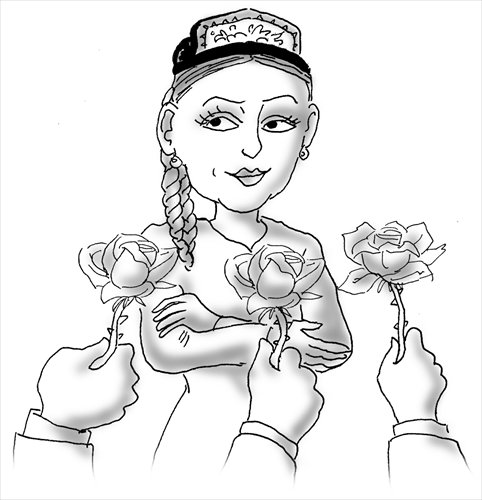Central Asia at no risk from bigger ambitions

Illustration: Liu Rui/GT
This seems to be a major year for five republics in Central Asia. Besides constant exchanges with its traditional partners, namely China and Russia, the region has welcomed leaders and officials from several other large countries.
In April, Turkish President Recep Tayyip Erdogan visited Kazakhstan to attend the 2nd Meeting of the Turkey-Kazakhstan High-Level Strategic Cooperation Council. He was followed by Indian Prime Minister Narendra Modi who visited all the five Central Asian countries in July. Japanese Prime Minister Shinzo Abe's visit in October was the first to the region by a Japanese leader in nine years. Soon the region saw the coming of US Secretary of State John Kerry, whose trip in late October set up a C5+1 format at a ministerial level with the five countries.
These "historic" visits took place at the same time as the Russia-led Eurasian Economic Union is making progress in Central Asia and China is pushing forward its "One Belt, One Road" initiative. Therefore, some observers believe the major powers are launching a new Great Game in the region.
Be it a game or cooperation, certain consequences are expected. These countries will either empower themselves or weaken their opponents; they will either achieve a win-win scenario or end in common ruin. No one dares to seek overall destruction. China advocates cooperation, but it seems hard to achieve among competing powers.
Weakening opponents is not easy either. The countries need not only their own strength, but also the "collaboration" of Central Asian countries. However, the leaders of Central Asian countries have rich experience of governing. They would not easily change their policies and sacrifice relations with China and Russia simply because of cooperation or agreements with other world powers.
The presidential elections in Kazakhstan and Uzbekistan and parliamentary elections in Tajikistan and Kyrgyzstan this year all went smoothly. The currency devaluation and economic downturn in some of the countries did not generate social chaos. Big powers cannot weaken any of them through making trouble in their peripheral areas, as they did in the past. Central Asian countries don't want to be trapped into zero-sum games among major powers.
Of the cooperative agreements Central Asian countries signed with India, Japan and the US, most are an extension of previous projects or development plans the Asian Development Bank articulated years ago.
Many big powers cast their eyes on Central Asia mainly to boost their own global clout. Turkey wants to play a leading role among Turkic countries. India is pushing forward a transport corridor between Russia, Iran and India. Japan is eyeing a permanent membership in the UN Security Council. The US and Europe need to maintain their clout, Russia wants to safeguard its sphere of influence, and China plans grand economic projects.
Each of them is busy with their own goals. There are possibilities that some of them strive to profit from the region, especially when regional countries are experiencing difficulties.
After the global financial crisis erupted in 2008, the influence of China and Russia in Central Asia can hardly be shaken. The calculations of some countries will not change the general landscape. Any containment of China or Russia will find no purchase under current circumstances.
Despite the different aims of big powers in Central Asia, there is plenty of room for cooperation. China does not want to see chaos in its neighboring countries. One of the challenges the "One Belt, One Road" project faces abroad is the lack of funds and markets in countries along the route. In other words, no matter whichever country invests and however much money it puts in, as long as it can help Central Asian countries achieve prosperity and stability, China will ultimately benefit from it.
China is one of the biggest neighbors of Central Asia. It needn't worry that these countries will seek help from far away and neglect what lies close at hand.
The author is deputy director of the "One Belt, One Road" Research Center at the Chinese Academy of Social Sciences. opinion@globaltimes.com.cn